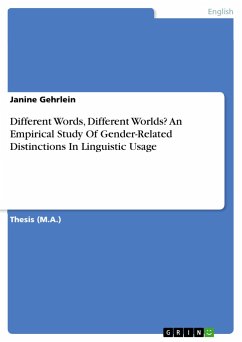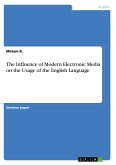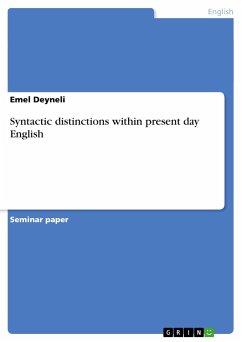Thesis (M.A.) from the year 2009 in the subject English Language and Literature Studies - Linguistics, grade: 2.0, University of Koblenz-Landau (Institut für Sozialwissenschaften), language: English, abstract: The purpose of this thesis paper is to show and explain the differences in the usage of language between women and men and to clarify how far these differences have an impact on everyday life of the sexes. This paper consists of eight chapters and a conclusion, which is divided into two parts, one being theoretical; the other empirical. Chapter 1 defines the difference between gender and sex and explains what is meant by the study of language and gender. Chapter 2 provides a short overview of the historical background of gender differences in language and is followed by Chapter 3, which will focus on the concept of language socialization. This chapter also deal with features that are typical for feminine and masculine speech as well as the position of women and men in society. Chapter 4 points out the differences in the language of women and men as well as the features of cross-gender communication. Furthermore Chapter 4 will discuss the conversational goals that are set by female and male conversational partners. After this discussion, Chapter 5 will focus on the topics of politeness in same-gender and cross-gender communication. Chapter 6 examines the consequences of gender differences in language. Chapter 7 and 8 will demonstrate an empirical part in which eight empirical studies on the usage of tag questions in female and male speech will be compared and discussed. By means of these empirical studies, the claims and statements about tag questions listed in the theoretical part will be supported and documented. To conclude, Chapter 9 will summarize the most important points of the thesis and alludes to future prospects for the study of language and gender.
Hinweis: Dieser Artikel kann nur an eine deutsche Lieferadresse ausgeliefert werden.
Hinweis: Dieser Artikel kann nur an eine deutsche Lieferadresse ausgeliefert werden.








